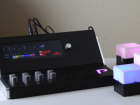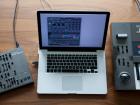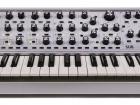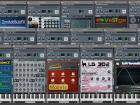Magus Modular Synthesizer Toolkit Kickstarter A Resounding Success

Post date:
A little while ago Rebel Technology, a modular manufacturer, launched their Kickstarter campaign. Their aim was to crowdfund three new compact desktop synthesizers and to accomplish this they set a funding goal of £12,000. It would seem that there are plenty of backers out there who are ready for a patchable, programmable synthesizer toolkit as it not only smashed through its initial funding goal, but eventually went on to reach more than double this goal. This resulted in Rebel Technology opening the doors for a couple of very enticing stretch goals, but let's first take a look at what their Magus Synthesizer Toolkit has to offer.
Freedom
One of the biggest selling points of the Magus is the freedom that it will give users. According to Rebel Technology, it is different from traditional synthesizers because there are none of the limitations that comes with being confined to a fixed function or paradigm. Instead, Magus enables you to pick whatever algorithm is required for the job, be it subtractive, FM, additive, granular, chaotic or spectral in nature. After selecting the algorithm of your choice, you can then patch up a storm.
Magus doesn't bind you to its library of algorithms either. Instead, you have the freedom to create your own by authoring them in Pure dta, C++, FAUST, or Max Gen. You also get a library of more than two hundred patches to work with, each of which can make for a good starting point when it comes to creating your own. This is because the Magus uses Rebel Technology OpenWare firmware, which means it is compatible with the same patch programs as their existing products.
The Rest of The Family
As mentioned earlier, the Magus isn't the only bit or hardware that Rebel Technology is working on. Their Kickstarter also includes the Wizard Minisynth and Alchemist Microsynth, described as the "Magus' little brother" and "baby of the family" respectively. The Wizard runs the same patches as the Magus and is also patchable as well as programmable. Despite sporting five assignable control knobs and four buttons, it's incredibly compact, which makes it ideal for a stand-alone synth or effects unit. Thanks to its USB MIDI device and host connections you can also plug your favorite controller straight in to the Wizard Minisynth. Then there is the Alchemist, which is small enough to fit in your hand, despite featuring four knobs, two trigger buttons, one mode button and trigger as well as CV inputs.
Stretch Goals
The Magus blew past its funding target in only five days, which opened the doors for the funding of some stretch goals. While the tote bags that everyone receives at 24K funding is nice, the extra patch cables at 28K, extra 32 megabytes of Flash memory at 32K, and MPE support at 36K caused quite a stir. At the conclusion of the Kickstarter Campaign, the final result of £31471 was so close to the 32k stretch goal that the team decided to go ahead with the extra 32 megabytes of flash memory. They also hinted at news about the MIDI Polyphonic Expression in the future as well.
Rebel Technology
The Magus, Wizard Minisynth and Alchemist Microsynth are not the first foray into music electronics for Rebel Technology either. The London based synthesizer manufacturer has been active for more than a decade already and they boast a full range of eighteen different synthesizer modules. The company is committed to helping people realize their creative potential and their products are both Open Source and Open Hardware. This is the second successful Kickstarter for Rebel Technology as they also delivered the OWL Programmable Effects Pedal to backers a few years ago.
Conclusion
With its rotary encoders and OLED display as well as 20 analogue patch points that have unique bidirectional capabilities, the Magus is definitely a head-turner. To get your hands on the Magus Synthesizer Toolkit, a pledge of £420 or more was required, while the Alchemist Microsynth was up for grabs at £90 and the Wizard Minisynth for £160. Other pledge options included the Magus Eurorack Edition for £430 or more and the Magus Timeless Edition for £520 or more. Backers eager to get their hands on the full set could pledge £620 or more.






